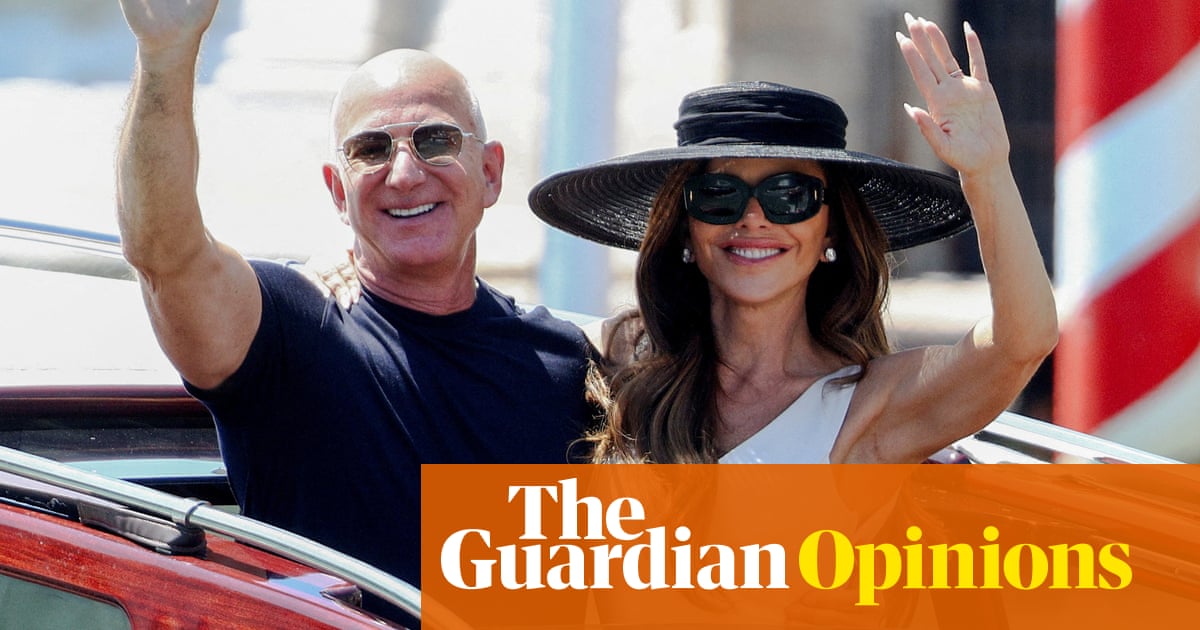If last week was the best of times forZohran Mamdaniand the working people of New York City, it was the worst of times for the billionaires who spent a small fortune trying to stop him from securing the city’s Democratic mayoral nomination. The media mogulBarry Diller, to name just one, donated a cool $250,000 to Andrew Cuomo’s campaign, only to see the disgraced former governor lose by a decisive margin.
But Diller would soon be able to drown his disappointment inGreat Gatsby-themed cocktailsas hejoinedTom Brady, Ivanka Trump and at least three Kardashians for the cheeriest event on this season’s oligarchic social calendar:the Venetian weddingof the former TV journalist Lauren Sánchez and the Amazon founder Jeff Bezos.
It was a juxtaposition that even CNN questioned, as the networkcut from an interviewwith Mamdani to coverage of the gilded spectacle. Thereportedly $50maffairbooked all nineof Venice’s yacht ports,closed parts of the city to the publicand forcedthe relocation of hotel gueststo make room for the happy couple. It all served as a stark if sumptuous reminder that there is no expense the megarich won’t pay to secure their own comfort – except, of course, the toll their extravagance takes on the communities from whom they extract their wealth.
The lovebirds’ choice of Venice alone demonstrates their carelessness. Because the city comprisesmore than 100 islandsin the Adriatic Sea, it’suniquely vulnerableto rising sea levels driven by warming global temperatures. Though Sánchezclaims to be“dedicated to fighting climate change”, and Bezos hascalled the issue“the biggest threat to our planet”, their guests arrived in the City of Bridges via96 private jets,the most carbon-intensive modeof transportation. Bezos has made splashy commitments to fighting climate change, like pledging$10bnto his Bezos Earth Fund, while Amazon has promised to becomecarbon neutralby 2040. But emissions from Amazon’s delivery fleetsoaredfrom 2019 to 2023, and itsnewest data centerwill guzzle millions of gallons of water and the energy equivalent of one million homes every year.
This disingenuousness is as much a business strategy for Bezos as Prime’s two-day delivery, enabling him to launder his reputation without hurting his bottom line. The pattern played out last year with his ownership of the Washington Post – where, as soon as he felt threatened by an ascendant Donald Trump, journalistic integrity fell overboard more quickly than an inebriated wedding guest on a luxury gondola.
As I covered ina columnearlier this year, Bezoskilled the Post’s endorsementof Kamala Harris,directed the editorial boardto publish op-eds that only support “personal liberties and free markets” andoversaw the exodusof more than 20 reporters and editors. Pamela Weymouth, granddaughter of trailblazing Post publisher Katharine Graham, described this capitulation ina recent piecefor the Nationas endangering “the very thing that makes America a democracy”.
In fairness to Bezos, though, charity-washing is an occupational hazard for billionaires. Mark Zuckerberg initially donated to organizations fighting the California housing crisis thathe helped exacerbate, before quietlyending his fundingthis year. The Gates Foundationgives 90% of its fundingto non-profits in wealthy countries rather than the impoverished ones whose GDPs are smaller than its namesake’s net worth. The magnanimity of the uber-wealthy tends to produce what the journalist Anand Giridharadashas called“fake change”, or efforts that stop short of systemic change because those systems underpin the benefactors’ vast wealth.
That’s why any vision of progressive change cannot rely on Bezos or his celebrity wedding guests to operate against their self-interest. (No, not even Oprah.) A Green New Deal will not come from oligarchical guilt, but from mass movements. Like the one thatdeployed almost 30,000 door knockersand pooled funds from 27,000 donors to share Mamdani’s message of genuine economic empowerment.
Mamdani’s victory on Tuesday added to a growing body of proof that even billionaires don’t always get what they want. Last year, Elon Muskspent more than a quarter of a billion dollarselecting Republicans, but no amount of money could save him from Donald Trump’s mercurial temper. Nor did his wealth sway the voters of Wisconsin, where hecontributed $21mto a state supreme court candidate who ended up losing by 10 points.
Voters’ growing skepticism of the 1% is no doubt being stoked by grassroots activism. Like in Venice, where local protesters threatened to fill canals withinflatable crocodiles, forcing the wedding of the century to relocate to the city’s outskirts. Back stateside, progressives Bernie Sanders and Alexandria Ocasio-Cortez continue todraw record crowdsacross the country on their Fighting Oligarchy tour. At a recent stop in Oklahoma – a state Trumpwon by 33 points– Sanders spoke toa standing-room only crowd.
Might a billionaire backlash be building, just in time for next year’s midterms?
